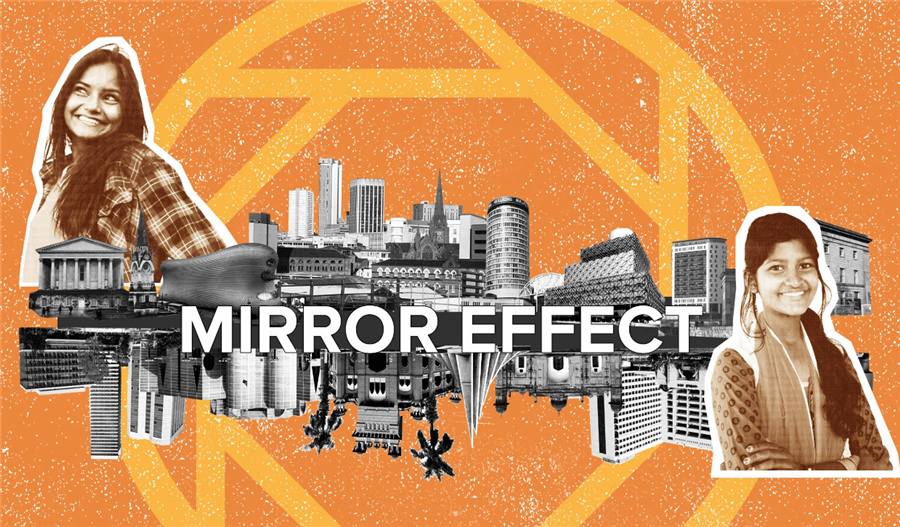- Home
- News
- Mirror Effect: Sharing untold stories of Bangladeshi women in Birmingham and Dhaka
Mirror Effect: Sharing untold stories of Bangladeshi women in Birmingham and Dhaka
28 October 2020

Artwork by Caitlin Abbott
Mirror Effect is an international project linking Birmingham Repertory Theatre, Together We Can from Bangladesh and Komola Collective, a London-based community interest, theatre and arts company dedicated to telling women’s stories that often go untold. It is one of 18 new commissions funded by Transforming Narratives Digital Collaborations Programme.
Through a series of drama workshops over Zoom between Bangladeshi-heritage women in Birmingham and their counterparts in Dhaka, Mirror Effect will be a collection of five-minute films of their shared experiences.
Komola Collective co-founders Leesa Gazi and Sohini Alam are British Bangladeshi, and fellow co-founder Filiz Ozcan is Young REP Director at Birmingham Repertory Theatre (The REP) and has been delivering outreach work in Birmingham over the past year. Here Filiz talks us through the project.
The Rep has put out an open call for young girls in Birmingham between 13-18 to get involved with the project.
TN: What are the aims of your project?
FO: Mirror Effect will connect ten young British women of Bangladeshi descent from Birmingham with ten young women from Dhaka. Over the course of ten Zoom workshops, we want them to collaborate and share ideas as we explore themes such as urban life and female identity. We hope that together they will be able to find a narrative that expresses their experiences, and then be able to share it through short films.
We will endeavour to work with a broad cross-section of people, including participants who are D/deaf or have disabilities. We want to create a female manifesto that will explore how to overcome challenges of all sorts, and celebrate each other's rich cultures and differences.
TN: How will the project benefit the women participating?
FO: We hope in part that learning about each other’s cultures and cities will allow the participants to reflect on what makes their own experiences particular to them. The young women will work together digitally and create a film together exploring the new realities they are living as a result of the pandemic and the implications that Covid-19 has created for their futures.
Through these workshops they will be able to build an understanding of each other’s lives and the different worlds they inhabit. The project will be facilitated by an all-female team of artists to encourage a sense of safety and a supportive space for women to share.
TN: What does your project involve and what techniques and technologies will you be using?
FO: The participants will take part in ten drama workshops on Zoom and will then pair up and work together over video-calls.
Each of the ten duos will create a five-minute film exploring the similarities and differences between their home cultures, in response to what has happened during the COVID pandemic. The participants will use their phones to make films of themselves, which they will then upload and share with UK Practitioners. The UK practitioners will then edit the films together so that the women can present their finished pieces on YouTube, Facebook, Twitter and Instagram and on Komola Collective’s website.
In Bangladesh these creative responses will be shared by Radio Dhoni and Prothom Alo, the largest Bengali daily newspaper and Radio Dhoni, which is a free-access internet radio station and the first digital FM news-based radio station in Bangladesh.
TN: What made you apply for the Transforming Narratives Digital Collaborations Programme?
FO: Through my work at The Rep I have had the chance to work with South Asian communities in Small Heath and Tilecross, and this inspired me to apply for the Transforming Narratives Digital Collaborations Programme.
As the co-artistic director of my arts company Komola Collective, I have been part of developing a practice that is built around projecting women’s voices and female narratives, working across cultures and borders. Through Komola I have made work in Bangladesh several times, and we’ve found great connections there with local people and artists.
I want to bring together all these experiences and make work that supports young women both in Birmingham and Bangladesh.
Komola Collective has won multiple awards worldwide for its documentary film Rising Silence that sheds light on the lives of sexual violence survivors in the aftermath of the 1971 Liberation War of Bangladesh. www.komola.co.uk
Birmingham Repertory Theatre is the only producing theatre in the UK’s Second City. The REP’s mission is to create artistically ambitious popular theatre for, by and with the people of Birmingham and the wider world. The Rep will help the Mirror Effect project engage with local young Bangladeshi women as well as supporting the delivery of the workshops. www.birmingham-rep.co.uk
Together We Can was founded in 2018 by Quazi Nawshaba Ahmed, a renowned film and TV actress and social activist running participatory projects in Bangladesh, working with the most vulnerable communities and those living in the most deprived areas, including refugee children and people living in the Hill Tracts. www.facebook.com/Quazi-Nawshaba-Ahmed
Note: The views and opinions expressed in projects funded by Transforming Narratives are those of the artists and organisations delivering the projects, and do not necessarily reflect the policies or position of Transforming Narratives, Culture Central, the British Council or Arts Council England.
← Read other news articles